Big Waves and Blank Pages:
Chosen Battles of a Surf Writer
Why I surf
The reasons why I surf go back to when I was a kid. I am from San Diego, and I am a product of my environment as much as anyone else is.
As far as I can remember, my fascination with surfing began around nine or ten years old. I recall reading Surfer Magazine, wearing Billabong clothes, and having friends who surfed and boogie boarded.
I have no idea how old I was the first time I boogie boarded, but the first time I learned to surf was when I was about ten years old at Oceanside Aquatics Camp at the Oceanside Pier. Both of my parents worked – my mom was a teacher and my dad was a stockbroker – so my brothers and I did sports camps and things like that when we weren’t in school.
One time, my mom signed me up for Oceanside Aquatics camp with one of my friends. I had the best time ever. The camp was great. They taught us about the waves and the currents, and how to keep a distance from the pier. They taught us how to surf and boogie board. They had a bunch of different boards for us to try.
I remember getting my first mini barrel on a boogie board and learning how to stand up on a foam board. If I think about the most fun times I ever had in my life as a kid, a few things come to mind: Oceanside Aquatics Camp, the skatepark at Magdalena Ecke YMCA, and playing Little League. Those are the first things I can think of off the top of my head.
The first thing I ever bought with my own money was a surfboard. I saved up $50 from my allowance and bought a fat, 5’10 shortboard. I only took it out a few times. I got really into baseball and hockey, and rarely went to the beach. I always loved it when I went, but never prioritized it. I surfed maybe a few times a year, but never consistently enough to get good at it.
Then, for some reason, I stopped. I don’t even know why. Surfing fell off my radar. I just never made it a priority. Thinking back on it now, it seems like a huge mistake. I should have prioritized surfing more at an earlier age.
So, I put my surfing dream on hold for many years while I pursued other interests, but somehow that dream never died.
I don’t think I had surfed in probably 20 years before I picked it up again in Mexico.
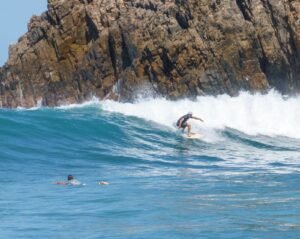
Me surfing at a secret spot in Mexico called Rasta Point. You can look, but you won’t find it.
How I Wound Up in Mexico
I moved to Mexico unexpectedly in April 2020. I had just been evacuated from Ghana – where I was working with Peace Corps – due to Covid.
Before leaving for Ghana, I sold or gave away 90% of my belongings – including my car – to move to Ghana and work for the Peace Corps. I packed and planned meticulously for months to make the move. I had to go to the doctor several times to get shots and get all the medical paperwork done, even though I had no health issues. It took months of hard work and preparation to get to Ghana.
However, after living in Ghana for three months, I heard rumors about a strange virus that started in China and was spreading fast. I remember thinking to myself, ‘’Well, good thing I’m out here in Ghana in the middle of nowhere. That virus will never find me here.’’
A few days later Peace Corps told us we are all on the next plane flight home. We weren’t allowed to return to our towns to pack our stuff. They emergency evacuated us from right where we were. They packed us up and put us in a van for the next flight out of Accra.
Our local hosts packed our suitcases for us and delivered our stuff to the airport. Almost everyone got their stuff. Out of hundreds of suitcases scattered all over Ghana, very few items were delayed or missing. Almost every item was returned to its owner in record time, which was an incredible logistical feat.
After a long flight home from Accra, to Heathrow, to JFK, to San Diego, I was right back where I started three months earlier. I was scheduled to be in Ghana for two years, but thanks to Covid, I found myself back in San Diego with no job, no place to live, no car, and nothing except my guitar, suitcase, and backpacks.
I had to decide what to do. While I was in Africa, I found myself thinking, ‘’I should go to Mexico and learn Spanish.’’ That was my tentative plan. I envisioned spending two years serving in the Peace Corps, traveling in Africa for some time, and then moving to Mexico. But that plan got turned upside down by Covid, and I had to figure out my next steps.
It was March 2020, and pretty much every international border had shut down, except the U.S.-Mexico border, which was probably the only major border still open.
So, I decided to move my plan of going to Mexico up by two years and leave right now – because I could. Hell, I was already packed.
It actually worked out perfectly. If I had never joined Peace Corps, I never would have sold my car and all my stuff. If I had never sold my car and all my stuff, I don’t think I would have moved to Mexico.
Everything happens for a reason. I moved to Mexico in April 2020.
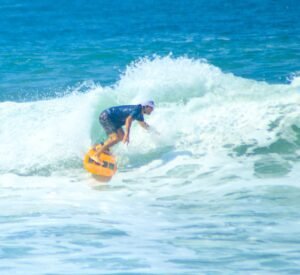
Me surfing in Bahía Santiago, Manzanillo.
Life in Mexico
I walked across the border with my guitar, suitcase, and two backpacks as casually as if I were going to Ensenada for the weekend. All I needed was my passport. I remember thinking that it’s a much different experience for Mexicans who move to the United States.
As I walked across the border with all of my bags, several people tried to help me. They were working for tips, of course. For some reason, I was so stubborn that I insisted on carrying all of my bags myself. I don’t know why. They were literally laughing at me, like ‘’why doesn’t he let us help him?’’ They were right. I should have let them help me. But I walked across the border – stubborn as a donkey – carrying all my stuff. Then I got into an Uber in Tijuana and went to the condo I rented. Airbnbs were dirt cheap during Covid.
The condo was in a brand-new complex that was somewhat out in the boonies – in the hills of Tijuana. Tijuana has a rugged landscape with lots of hills, mountains, cliffs, valleys, and rough terrain. This place was out in the hills, and it was new, with low occupancy. I didn’t want to be around a bunch of people during Covid. Plus, there was a new park where I could work out. So, the place seemed like a good fit on paper.
What I didn’t realize is how bad the noise would be. The community was still under construction, and there was construction noise from dawn until dusk every day. I used earplugs and music to study in those conditions and got my Spanish good enough to feel confident moving deeper into Mexico.
I moved to León, Guanajuato, Aguascalientes, and Guadalajara before I started missing the beach. I had been in Mexico for about 6 months when I talked to my friend Chris on the phone. We talked about meeting up in one of Mexico’s beach cities, like maybe somewhere in Oaxaca. Talking about it made me realize how much I missed the ocean.
So, I looked up the closest beaches from Guadalajara and I chose Manzanillo because it 1) didn’t look too touristy, and 2) it looked like it would be a good place to learn how to surf again. I don’t remember what made me decide to learn how to surf again, or what brought it on. But I do recall that when I got to Manzanillo, one of the first things I did was buy a surfboard.
Why? I don’t know.
It was just a childhood dream that somehow never died. I always wanted to surf, and for some reason, I just felt called to live that dream. I decided now was the time. It was something I wanted ever since I was a kid, but other things always took priority. I just decided that now was the time I was going to make surfing a priority. I don’t know why I made that decision. I guess I just realized that I had the freedom to.
Like, one day I just said, ‘’I am going to move to the beach and surf every day.’’ So, that’s what I did.
However, my first attempts at surfing were a struggle.
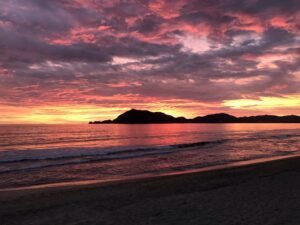
A spectacular sunset at Bahía Santiago, Manzanillo. The photo doesn’t do it justice.
Surfing in Mexico
The board I bought was way too small. I bought a tiny shortboard, and I needed to be learning on a foam board or a longboard. That was the first problem.
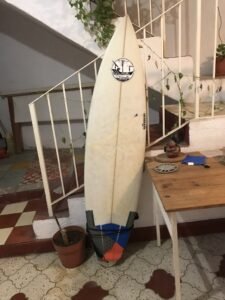
The board I bought right when I moved to Manzanillo. It was too small to learn on.
I also have a protruding sternum, which means my chest bone sticks out and pokes into the board while I am paddling. It causes tremendous pain – so much pain that I had to get out of the water after ten minutes the first time I paddled out.
The third problem is that I was trying to learn in conditions that were way too difficult for beginners. The waves were too big. The currents were too strong. I was a good enough swimmer to avoid drowning, but not a good enough surfer to get up on the board.
Due to this combination, I got absolutely worked the first few times I tried to surf. Within 20 minutes, I was so gassed from paddling and in so much pain from my chest bone that I had to come back in. One day I came back to the beach and cried because I was trying so hard and getting my ass kicked so badly. Demoralized and with significant pain from my chest bone, I wondered if maybe surfing just isn’t for me.
But thankfully, I didn’t give up. I went online and found a padded wetsuit that greatly reduced the pain in my sternum. Then I found the phone number of a local surf school and called the coach. Hiring my surfing coach, Roscoman, was the best thing I ever did for my surfing.
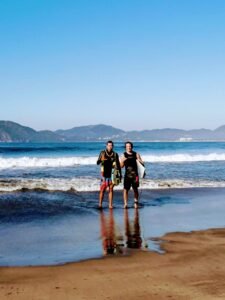
My coach, Roscoman, and I after surfing in Bahía Santiago.
Roscoman put me on the right board and in the right conditions. We went out together every morning for a month, and after the month, Rosco told me I was ready and didn’t need lessons anymore.

Me with a foamie after one of my first surfing sessions. Stoked. Notice the padded wetsuit vest.
Not only did Rosco teach me to surf, but he also connected me with the right people. He introduced me to other surfers, which led me to being invited on surf trips. Those surf trips were crucial to my growth as a surfer.
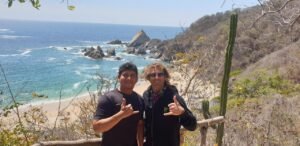
My friend Miguel and I on a surf trip to La Ticla, Michoacan – one of many surf trips we had together.
Rosco helped me find the right board once I had graduated from a foamie, and also got me signed up for my first surf competition. Rosco was an invaluable resource.
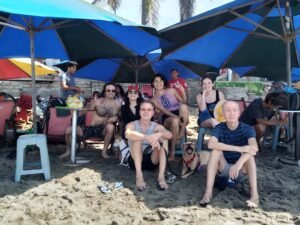
My friends and I at the beach at my first surf competition.
If you want to learn how to surf, the best suggestion I can make is to get a coach. If a coach is too expensive, try camps or group lessons. It’s not just about the lessons you learn, it’s also about the people you meet.
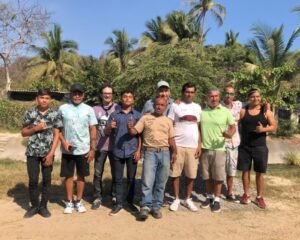
Me with some of the local surfers in Bahía Santiago, Manzanillo. Soy yo el güero.
Writing About Surfing
For me, writing and surfing go hand in hand. I write about my life, and surfing has been a big part of my life for the past 4 ½ years or so.
But why write about surfing? What purpose does it serve? What real problem does it solve?
Humans need stories and connection – things we can’t get from AI bots. We need stories from people who know what it feels like to ride waves and face the blank page. AI bots can write, but they don’t know the human experience, and they never will. It’s something they could never duplicate because they aren’t living a real life, and real life is where writers operate.
When we write about our real life, we do the one thing that the bots can’t – share our unique human experiences. Those unique human experiences are what people connect with. Writing is a way to connect with people in a way that is deep and meaningful. Writing is a way to share knowledge and wisdom that can be of great value to others.
As a surfer, I am armed with the unique experiences of travelling, meeting people, learning new languages, and catching waves. This landscape is a fertile ground for interesting and powerful stories.
Surfing life is never boring. There’s always some element of adventure. I’ve seen alligators, sharks, giant sting rays, whales, dolphins, turtles, fish, eels, sea snakes, and all types of fish and birds while surfing.
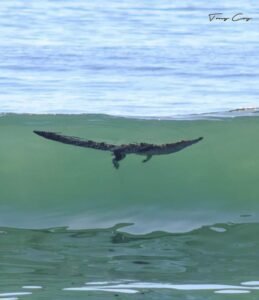
Swim in Bahía Santiago for long enough, and you might come across an alligator. (Image Credit: Tony Coy)
I’ve surfed Pascuales, Barra de Navidad, Ranchito, La Ticla, Paraiso, and other surf spots. I’ve visited Colima, Comala, Suchitlán, Canoas, La Maria, and a bunch of other non-surf spots. All of those places have taught me something, and by writing about them, I share the lessons with others.
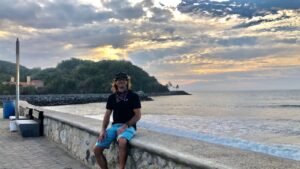
Me in Barra de Navidad
Surfing challenges you to keep exploring and keep having new adventures – which makes you grow as a person and leaves you with valuable life lessons that you can pass on to others. Surfing provides access to a network of interesting people to learn from. Surfing gives you a lifestyle and place to fit in when you feel like you don’t fit in anywhere else.
Some people, if you asked them why they surf, might only write a sentence. Or a paragraph. And those would be completely legitimate answers.
‘’To connect with God through surfing.’’ Completely legitimate answer.
‘’Because surfing makes me happy.’’ Another perfectly legitimate answer.
When I asked myself why I surf, I wrote this document. That’s why I am a pro. I have a lot to say about it, and I could keep talking forever. There are dozens of stories within this story, and dozens more where those came from.
Find something that you can talk about forever, and turn pro at it. I am no career coach, but I think that’s pretty sound advice.
I write because I have to. It’s the only way that I can make sense out of my life and out of the world. It’s the only way that I can achieve some sense of clarity. I write because I can’t stop. It’s a form of madness. Writing is how I navigate life. This is just how I live. It’s the job that chose me. I write because I can’t do anything else.
For me, writing and surfing are a natural extension of each other. Part of the reason I write about surfing is to keep surfing alive in my life – to keep giving me new reasons to surf, meet new people, and seek out new adventures.
Making the World Better
There is a utilitarian aspect of surf writing. I think that a surf writer’s purpose in the grand scheme of things is to educate and entertain – without sacrificing one for the other.
To me, great content teaches you something. It educates you and makes your life better in some way. Otherwise, it’s junk food for the brain. The content you consume is food for your brain. I strive to consume only content that teaches me something useful and eliminate content that is distracting or counterproductive.
So, on some level, I see the surf writer’s job as being a teacher – going through life acquiring deep knowledge and sharing that knowledge so people can apply it to their lives and further their own interests.
There is value in real human stories. People buy books, movies, and Netflix subscriptions because they love stories. If you have a great story, then you have something of value. The world can always use a great story. We never get enough of them, and we’re always looking for the next one.
So, does the world need surf writers? Yes, our work is necessary in order for humanity to fully express itself. We provide a unique and interesting window into human life that is as valuable as any other. Living an interesting life inspires others. You make the people around you better when you live an inspired life.
If being a surf writer inspires you and makes you feel like you’re the best that you can be, then being a surf writer is not only your God-given right, but your responsibility. It is your job to share your stories. More than that, it’s your reason for being.
As a surfer, you love being in the ocean. As someone who loves being in the ocean, you are called to protect it. To get people to care about the ocean, you have to get them into the ocean. To get people into the ocean, you have to move, touch, and inspire them. That’s what writing about surfing does: it moves, touches, and inspires people. It inspires people to take action.
So, if my writing educates people, entertains them, and inspires them to care about the ocean, then I am contributing something meaningful to the world. My work has meaning, which is part of living a happy and productive life.
However, this path is not easy. The hardest part about becoming a surf writer is blocking out the distractions – all of the people and pressures that will try to pull you off this career path and onto another. All of the distractions that make you think ‘’maybe I should just take that shitty office job and forget about all of this.’’ Those are the voices you have to defeat – all the people, shadow careers, and addictions that eat up your time and pull you away from the work you want to be doing.
If you want to do this work, you have to be absolutely fierce about making time for it. You cannot let external pressures push you off course. You cannot let anyone tell you that you don’t belong. You cannot get sidetracked by alternate careers. You cannot let ‘’busy work’’ take you away from the real work of pursuing real dreams.
The only people who can walk this path are the people who truly want to. It’s too demanding unless your heart and soul are committed to it. If you can commit your life to this – and make a living at it – then you, my friend, deserve to be a surf writer. There may not be any medals or trophies, but you get life’s biggest reward – living life the way you want, on your terms.
You don’t have to show up for 30 years to a job you hate, and be told what to do by an adult you don’t respect.
That’s why I became a surf writer, and that’s what this is all about to me.
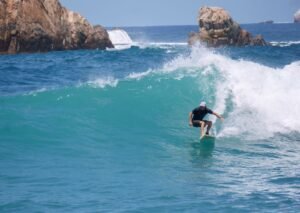
🤙🏼🤙🏼🤙🏼
Contact Me
If you read this entire thing, I really appreciate you. I put my heart and soul into this.
Contact me if you would like to work together.




0 Comments